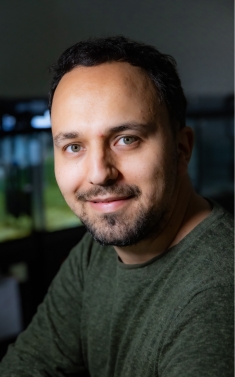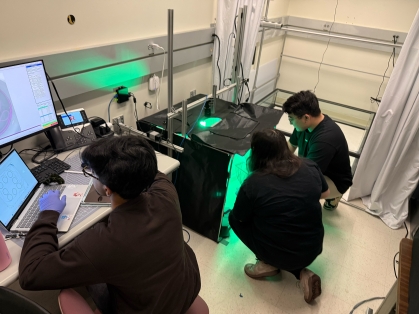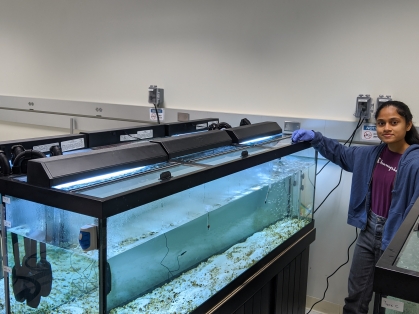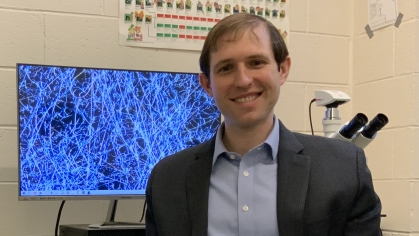ECE Professor Receives Prestigious NSF CAREER Award

Daniel Burbano, assistant professor in the School of Engineering Department of Electrical and Computer Engineering (ECE), has received a five-year, $644,498 National Science Foundation (NSF) CAREER award for his project, “Understanding and Analyzing the Feedback Principles Underlying Visuomotor Control Dynamics in Fish Schools.”
The NSF Faculty Early Career Development Program (CAREER) supports early-career faculty who exhibit potential as academic role models and leaders in research and education in their departments and institutions.
Fishing Out Answers
Burbano’s project builds on research he conducts in his Swarm Intelligence Laboratory focusing on understanding the how’s and why’s of collective behavior in complex networks, such as schools of fish.

In his CAREER project, he and his team of graduate and undergraduates will explore how schools of zebrafish respond to visual environmental cues to adjust how they “move through space, requiring constant sensory integration and motor adjustment.”
“In fish schools,” he adds, “we study how individual fish use visual cues from their environment or neighbors to make real-time adjustments to their motion. Through controlled experiments, data analysis, and mathematical modeling, we aim to uncover the rules fish follow when responding to visual cues.”
Facilitating Fast Decisions on the Move
Ultimately, according to Burbano Lombano, uncovering how fish use simple visual cues to make quick, adaptive decisions while swimming in groups will help to identify control strategies that directly apply to engineered systems.
“For instance,” he explains,” the mathematical models we develop can inform the design of control algorithms for swarms of drones or robots navigating through forests, collapsed buildings, or coral reefs – environments where GPS is unavailable and communication is limited.”
Burbano foresees situations such as robotic search-and-rescue operations, environmental monitoring by autonomous underwater vehicles, or ground robotic coordination to contain wildfires, where “each robot or vehicle must rely on local sensing and fast-decision-making, much as fish do, to coordinate as a group to accomplish complex tasks.”
Understanding the Origins of Intelligent Behavior

The project “provides insight into how animals with minimal cognitive and energetic resources achieve complex, coordinated behaviors,” he explains. "Understanding these fundamental sensory-motor control strategies can improve the design of autonomous multi-agent systems in engineering, while contributing to our understanding of the origins of intelligent behavior. Even basic organisms show forms of problem-solving and adaptation that underpin more complex forms of biological and artificial intelligence.”
Inspiring Curiosity and Wonder
Burbano is especially excited about the opportunity the award gives him “to bridge biology and engineering to understand natural behaviors and use them to guide the design of smarter, more adaptive autonomous systems.
“This work not only advances science and technology but also inspires curiosity and wonder in students and the broader public, which is especially rewarding,” says Burbano. “Receiving this award is both meaningful and incredibly motivating. “Personally, it’s an affirmation of the long-term vision and interdisciplinary nature of my work. Professionally, it provides the support needed to pursue bold research ideas and invest in educational innovation.”
In congratulating Burbano, ECE Chair and Professor Yingying Chen notes that, “Daniel’s achievement is a tremendous recognition of his outstanding work and dedication.
“It also reflects the high caliber of our ECE faculty and the strong, supportive mentoring environment we foster in the department. This honor not only celebrates Daniel’s individual excellence but also highlights our departmental commitment to nurturing impactful research and academic success.”
Schooling Students from K-12 through College
The CAREER grant includes an educational component, for which Burbano has structured four tiers, covering everything from K-12 outreach programs and hands-on undergraduate research experiences to curricular revisions and updates and a peer-led initiative to demystify STEM research and careers.


